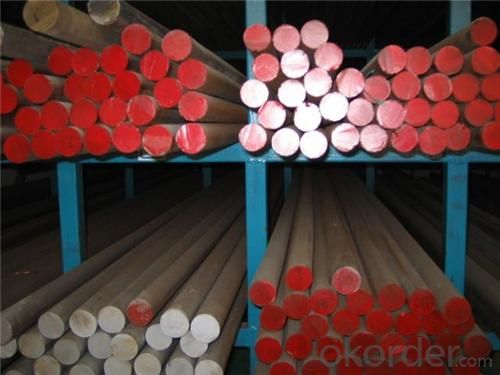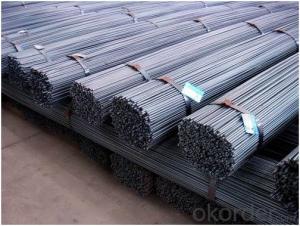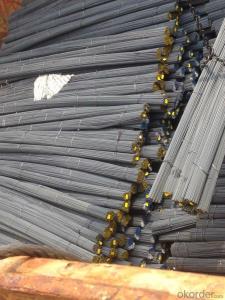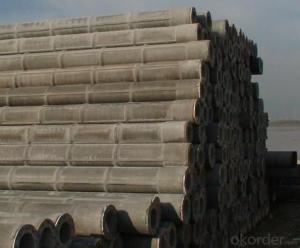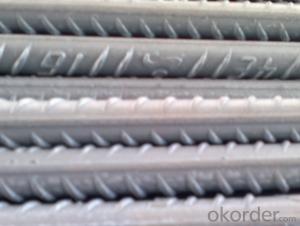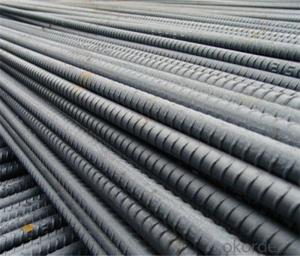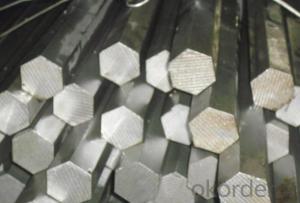Deformed Bar Steel Rebar Made in China with High Quality for Construction
- Loading Port:
- China main port
- Payment Terms:
- TT or LC
- Min Order Qty:
- 25 m.t.
- Supply Capability:
- 100000 m.t./month
OKorder Service Pledge
OKorder Financial Service
You Might Also Like
Product Description:
OKorder is offering Deformed Bar Steel Rebar Made in China with High Quality for Construction at great prices with worldwide shipping. Our supplier is a world-class manufacturer of steel, with our products utilized the world over. OKorder annually supplies products to European, North American and Asian markets. We provide quotations within 24 hours of receiving an inquiry and guarantee competitive prices.
Product Applications:
Deformed Bar Steel Rebar Made in China with High Quality for Construction are ideal for structural applications and are widely used in the construction of buildings and bridges, and the manufacturing, petrochemical, and transportation industries.
Product Advantages:
OKorder's Deformed Bar Steel Rebar Made in China with High Quality for Construction are durable, strong, and resist corrosion.
Main Product Features:
· Premium quality
· Prompt delivery & seaworthy packing (30 days after receiving deposit)
· Corrosion resistance
· Can be recycled and reused
· Mill test certification
· Professional Service
· Competitive pricing
Packaging & Delivery of Deformed Bar Steel Rebar Made in China with High Quality for Construction:
Packaging Detail: products are packed in bundle and then shipped by container or bulk vessel, deformed bar is usually naked strapping delivery, when storing, please pay attention to moisture proof. The performance of rust will produce adverse effect.
Each bundle weight: 2-3MT, or as required
Payment term: TT or L/C
Delivery Detail: within 45 days after received advanced payment or LC.
Label: to be specified by customer, generally, each bundle has 1-2 labels
Trade terms: FOB, CFR, CIF
FAQ:
Q1: Why buy Materials & Equipment from OKorder.com?
A1: All products offered byOKorder.com are carefully selected from China's most reliable manufacturing enterprises. Through its ISO certifications, OKorder.com adheres to the highest standards and a commitment to supply chain safety and customer satisfaction.
Q2: How do we guarantee the quality of our products?
A2: We have established an advanced quality management system which conducts strict quality tests at every step, from raw materials to the final product. At the same time, we provide extensive follow-up service assurances as required.
Q3: How soon can we receive the product after purchase?
A3: Within three days of placing an order, we will begin production. The specific shipping date is dependent upon international and government factors, but is typically 7 to 10 workdays.
Images:
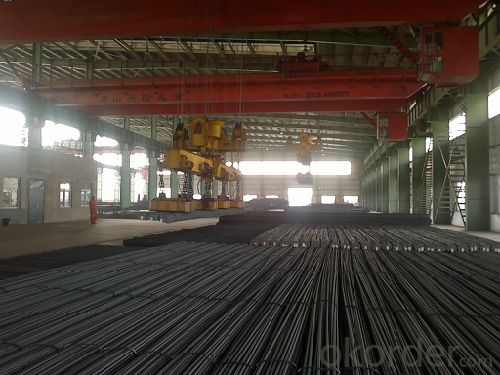
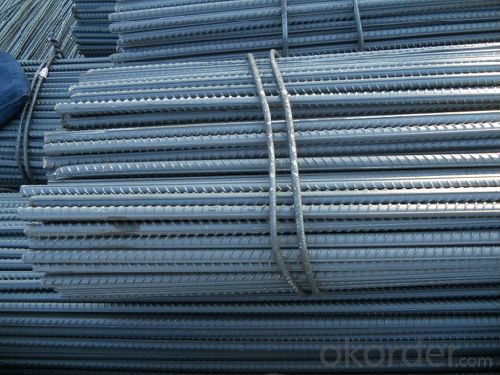
- Q: What are the different welding techniques used for special steel?
- There are several welding techniques used for special steel, including Tungsten Inert Gas (TIG) welding, Metal Inert Gas (MIG) welding, Shielded Metal Arc Welding (SMAW), and Flux-Cored Arc Welding (FCAW). Each technique has its own advantages and disadvantages, and the choice of technique depends on factors such as the type of special steel, the thickness of the material, and the desired outcome of the welding process. TIG welding is commonly used for high-quality welds on thin materials, while MIG welding is suitable for thicker materials and higher production rates. SMAW is a versatile technique, suitable for various steel types and thicknesses, and FCAW is often used for outdoor applications and on thick materials.
- Q: How does special steel contribute to improving product reliability in critical applications?
- Special steel contributes to improving product reliability in critical applications by providing enhanced strength, durability, and resistance to corrosion and wear. This high-performance material ensures that critical components can withstand extreme conditions, such as high temperatures or heavy loads, without compromising performance or safety. Additionally, special steel's precise composition and manufacturing techniques allow for tight tolerances and consistent quality, minimizing the risk of failure or malfunction. Ultimately, its use in critical applications enhances product reliability, ensuring the smooth operation and longevity of essential equipment and systems.
- Q: Can special steel be used for making marine components?
- Special steel, also called marine grade steel, is specifically designed for the production of marine components due to its ability to withstand the harsh conditions of marine environments. These environments are exposed to corrosion, high humidity, and saltwater, all of which can cause ordinary steel to deteriorate rapidly. Marine grade steel is typically manufactured with additional alloys, such as nickel, chromium, and molybdenum, which provide exceptional corrosion resistance and durability. These alloys assist the steel in resisting the corrosive effects of saltwater and prevent rust formation. Moreover, special steel is frequently coated with protective coatings or treated to further enhance its corrosion resistance. Marine components produced from special steel encompass ship hulls, propellers, shafts, valves, pipelines, and various structural elements. The utilization of special steel guarantees the longevity and dependability of these components in challenging marine conditions. Furthermore, the strength and toughness of special steel enable it to withstand the high mechanical stresses and impacts encountered at sea. In conclusion, special steel is an ideal material for the production of marine components due to its superior corrosion resistance, durability, and strength. It contributes to the prolonged lifespan and reliability of marine structures and equipment in unforgiving marine environments.
- Q: How does corrosion-resistant steel protect against chemical attacks?
- Corrosion-resistant steel protects against chemical attacks by forming a protective layer on its surface that prevents the penetration of corrosive substances. This layer, usually composed of chromium oxide, acts as a barrier that shields the underlying steel from the damaging effects of chemicals, thus preserving its structural integrity and preventing corrosion.
- Q: What are the main characteristics of structural steel forgings?
- Structural steel forgings offer numerous advantageous qualities that make them highly suitable for a wide range of construction and engineering purposes. To begin with, the outstanding strength and durability of structural steel forgings are among their main attributes. Steel possesses remarkable tensile strength, allowing it to bear heavy loads and withstand stress-induced deformations. This makes structural steel forgings ideal for supporting large structures and withstanding dynamic forces such as wind or seismic activity. Another noteworthy quality is the versatility of structural steel forgings. Steel can be shaped and sized into a diverse array of forms, making it adaptable to various design requirements. It can be forged into intricate and complex shapes, enabling the creation of precise and customized components. This versatility enables the application of structural steel forgings in a multitude of scenarios, ranging from beams and columns in buildings to bridges and offshore structures. Moreover, structural steel forgings exhibit excellent weldability. Various welding techniques can be employed to easily join steel components together, creating robust and dependable connections. This enhances the overall structural integrity and longevity of steel elements. One more key characteristic of structural steel forgings is their cost-effectiveness. Steel is an economical construction material due to its abundance, recyclability, and ease of manufacturing. The production process for steel forgings is efficient and can be scaled up to meet the demands of large-scale construction projects. Consequently, it represents a cost-effective choice for numerous applications. Furthermore, structural steel forgings are renowned for their resistance to corrosion. Steel can be treated with coatings or alloys to enhance its resistance against rust and other forms of corrosion. This makes it highly suitable for deployment in environments with high humidity, exposure to saltwater, or harsh weather conditions. In conclusion, the exceptional strength, versatility, weldability, cost-effectiveness, and resistance to corrosion are the primary characteristics of structural steel forgings. These qualities position structural steel forgings as the preferred choice for a multitude of construction and engineering applications, offering durability, reliability, and longevity to structures.
- Q: How does special steel perform in terms of wear resistance?
- Special steel is known for its exceptional wear resistance. Due to its unique composition and heat treatment, it exhibits a higher level of hardness and toughness compared to regular steel. This enables it to withstand abrasion, impact, and other forms of wear, making it highly suitable for applications where durability and longevity are crucial, such as in industrial machinery, cutting tools, and automotive components.
- Q: What are the requirements for special steel used in corrosive environments?
- To ensure durability and performance in corrosive environments, special steels must possess specific properties. The requirements for these steels can be summarized as follows: 1. Excellent corrosion resistance is the primary requirement. The steels should be able to withstand aggressive substances like acids, alkalis, and salts without showing signs of corrosion. This ensures the longevity of the steel and maintains its performance. 2. High strength is crucial for handling mechanical stresses imposed on the steel in corrosive environments. It is particularly important for applications with heavy loads, pressures, or impacts, as it helps maintain the steel's integrity and structural stability. 3. Resistance to pitting and crevice corrosion is essential. These localized forms of corrosion can occur in the presence of certain aggressive chemicals or stagnant environments. Steels should be resistant to such forms of corrosion to prevent localized damage and potential failure. 4. Resistance to stress corrosion cracking is necessary. This phenomenon occurs when a corrosive environment compromises the material's integrity under tensile stress. Special steels should be resistant to stress corrosion cracking to ensure reliability under applied loads. 5. Good resistance to intergranular corrosion is important. This type of corrosion along grain boundaries weakens the material. Special steels used in corrosive environments should have resistance to intergranular corrosion to maintain structural integrity. 6. Thermal stability is essential for high-temperature corrosive environments. Special steels should exhibit thermal stability to resist degradation and maintain their properties in elevated temperatures. 7. Ease of maintenance is a desirable characteristic. Special steels used in corrosive environments should be relatively easy to clean, resistant to fouling or scaling, and compatible with commonly used cleaning agents or procedures in the industry. It is important to note that the specific requirements for special steels in corrosive environments may vary depending on the application and type of corrosive substances encountered. Therefore, careful consideration of specific needs and consultation with experts in the field is crucial for selecting the most appropriate steel for each corrosive environment.
- Q: How does special steel perform in electrical applications?
- Special steel is typically used in electrical applications due to its excellent conductivity and high resistance to corrosion. It provides efficient electrical conductivity, ensuring minimal power loss and heat generation. Additionally, special steel exhibits good magnetic properties, making it suitable for applications that require magnetic fields, such as transformers and motors. Overall, special steel performs exceptionally well in electrical applications, meeting the demanding requirements of the industry.
- Q: Does special steel have any magnetic properties?
- Depending on its composition and treatment, special steel can indeed possess magnetic properties. The primary constituent of steel is iron, which is inherently ferromagnetic and capable of being magnetized. However, the magnetic characteristics of steel can be influenced by the presence of other elements such as nickel, cobalt, and various alloys. For example, stainless steel, which contains chromium and nickel, is typically either non-magnetic or only weakly magnetic. Conversely, materials like tool steel or high-speed steel may exhibit more pronounced magnetic properties due to their specific composition and heat treatment. Consequently, it is crucial to take into account the precise type of special steel and its alloying elements when assessing its magnetic behavior.
- Q: How does special steel perform in corrosive environments?
- Special steel is specifically designed to perform well in corrosive environments. It is made with a higher content of alloying elements such as chromium, which forms a protective oxide layer on the surface of the steel. This oxide layer acts as a barrier, preventing the steel from coming into direct contact with the corrosive elements in the environment. Additionally, special steel may also contain other alloying elements such as molybdenum, nickel, or copper, which further enhance its resistance to corrosion. These elements help to increase the steel's ability to withstand pitting, crevice corrosion, and stress corrosion cracking, which are common types of corrosion that occur in corrosive environments. Furthermore, special steel is often treated with various surface coatings or finishes that provide additional protection against corrosion. These coatings can include zinc, epoxy, or polymeric materials, which create an additional barrier between the steel and the corrosive elements. In summary, special steel performs exceptionally well in corrosive environments due to its high content of alloying elements, protective oxide layer, and additional surface coatings. It offers excellent resistance to various forms of corrosion and ensures the longevity and reliability of structures or equipment operating in such environments.
Send your message to us
Deformed Bar Steel Rebar Made in China with High Quality for Construction
- Loading Port:
- China main port
- Payment Terms:
- TT or LC
- Min Order Qty:
- 25 m.t.
- Supply Capability:
- 100000 m.t./month
OKorder Service Pledge
OKorder Financial Service
Similar products
Hot products
Hot Searches
Related keywords





